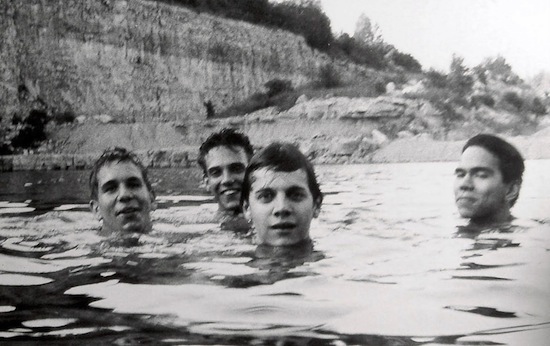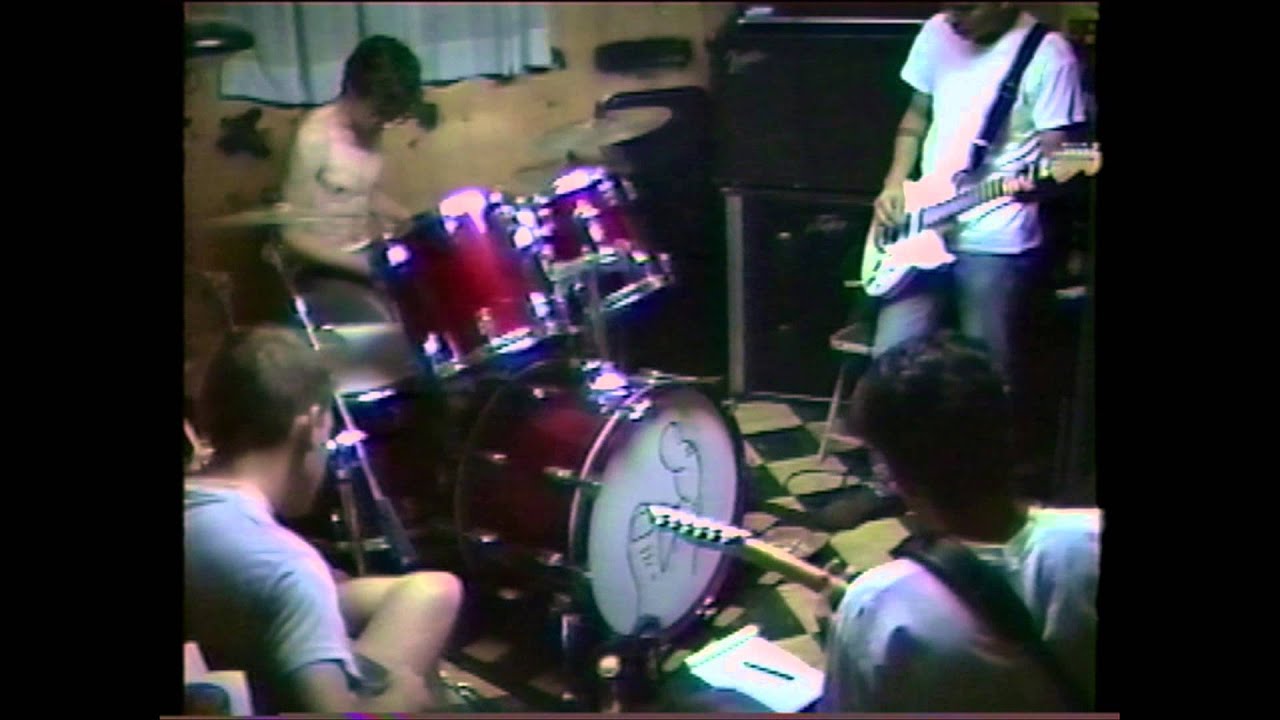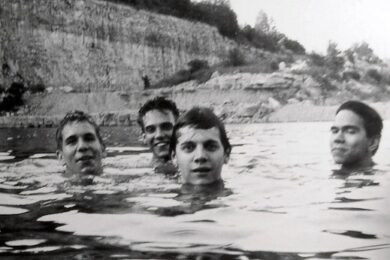If the members of Slint really had visited the fortune teller spoken of in hushed tones by Brian McMahan in ‘Breadcrumb Trail’, the opening song of their second album and masterpiece Spiderland, and gazed into her crystal ball, they could surely never have predicted their canonisation into the realms of rock mythology. In the song, the fortune teller is persuaded to join the protagonist on the rollercoaster, but although the ride dipped shortly after the release of Spiderland when the band split, the rise up to the heavens again has been meteoric.
First it was through the old fashioned oral tradition that the word was spread, mostly by chief prophet Steve Albini. ‘Good Morning, Captain’ featured on the soundtrack to Larry Clark’s controversial film Kids, and due to the relative chart success of Folk Implosion’s single ‘Natural One’, a fellow soundtrack pick, the album wound up in many homes. There came an aborted reunion when Touch & Go released the ‘Glenn’/’Rhoda’ 10", which had actually been recorded prior to Spiderland. Next, the activities of the band’s former members in groups such as Tortoise and The For Carnation revived interest, which surged again around the release of Mogwai’s Come On Die Young, influenced as it was by Spiderland.
In 2005, came the first reunion proper, to headline All Tomorrow’s Parties, then a tour performing Spiderland in its entirety in 2007 and headlining the final ATP in 2013. Activity has been sporadic, but the love for Slint has been constant, with social media, embraced by band alumni such as Dave Pajo, allowing the word to spread even further to a younger audience.
The mystique, too, has grown stronger with time, and the fact that the band never really got to play live much in their prime has added to the allure of the live circuit for the men who so famously appeared in that timeless black and white letterbox, disembodied heads swimming in a quarry, captured on camera by fellow Louisville luminary Will Oldham.
They’ve recently appeared on celluloid again, in the documentary Breadcrumb Trail, directed by Lance Bangs, the film-maker and Spike Jonze collaborator. Bangs famously hurls while filming behind the scenes on numerous Jackass movie ventures, and legend has it that McMahan was physically sick during the recording of Spiderland, such was the intensity of the sessions. It was a match made in indie rock heaven.
Many have tried to join the dots of Slint’s formation in Louisville from former bands Squirrel Bait and Maurice, but have drawn blanks. Even first album Tweez bore little resemblance to the high watermark of Spiderland, but the documentary has helped contextualise it like never before, while simultaneously drawing a distance between a serious, studious, suspenseful album, and the surprisingly regular and regularly silly guys who crafted it. This truly was a work that transcended its players, much to their surprise, embarrassment and delight.
After also re-releasing Spiderland, remastered by Shellac’s Bob Weston, earlier this year, the band are embarking on an extensive European tour, and I had a chance to interview one of the band’s dual creative axes, Britt Walford, via Skype.
So, so much has been written around the myths and legends of the band’s second and final album, I was determined to get a snapshot into the band as it stands now, ready to pack their bags and get back on the road, to find out what drives them. Walford was enchanting, a gentle soul, even though story had it he was the crazy one, the one that shat in cups and flooded Albini’s bathroom and was reputedly the notorious subject of The Jesus Lizard’s song ‘Mouth Breather’. Despite being the man behind the unusual drum signatures on ‘Nosferatu Man’, conversation with Walford was like ‘Don, Aman’ and the quieter moments of Spiderland, so after I finished, I also contacted the more vociferous David Pajo, the guitar virtuoso who started out as a shredder and developed into a touchstone for most of the best US alternative rock of the last two decades. Finally, I also touched base via e-mail with the diligent and thoughtful bassist Todd Brashear, who, although not on the forthcoming tour with the band, offered a third and frequently funny opinion, the constant background rhythm to an enlightening snapshot of Slint in 2014.
How did you end up working with Lance Bangs on the Breadcrumb Trail documentary?
Britt Walford: He got in touch with us. He first filmed stuff with us ages ago around the initial comeback gigs and originally he was just going to make a concert movie, but we got to know him and it became more than that.
I’ve met him during work with the Jackass guys and he famously pukes with little provocation – did you see any evidence of that?
BW: I did some filming with him, he was fun to hang out with but I certainly didn’t do anything to make him queasy.
How did you feel seeing yourself on the big screen for Breadcrumb Trail
BW: At first it was scary and weird, and then just weird.
David Pajo: As always, I feel very embarrassed for myself. I’m used to hearing my voice played back on recordings, but seeing video of myself is always a bummer – especially when the image is enlarged!
Todd Brashear: Weird, but I’m not in it that much, so that makes it easier.
Is it strictly for fans or has it garnered a new audience?
DP: I don’t think it’s necessarily for fans. It seems to appeal to people who have never heard Slint. Most likely because people may be into the humour more than the music, which I think is great.
TB: I feel like Lance made a movie that anyone could watch. While fans are going to get more out of it, I think it’s for a general audience.
Has it de-mythologised Spiderland or canonised it further?
DP: I believe it has turned Spiderland into a museum piece in some ways.
TB: I’ve heard people say that it sheds too much light, but in my opinion, while it does show us more as people, you can’t really take away from the combination of things that led to the band sounding the way it sounded and the album turning out the way it did.
What is the correlation between you, the players of it, and Spiderland the piece of music?
BW: I think a distance does come off from the film between us and the music.
DP: There’s not much distance, in my opinion. It’s in our blood. But rehearsing the songs does involve a certain amount of objectivity.
TB: I’m sure like a lot of creative things we were expressing some part of ourselves that was darker. But as shown in the documentary, we’re all fairly goofy people too.
How did the Spiderland remastering go? How happy were you with the results?
TB: I think it turned out really well. We let Bob Weston do what he does, and I think he did a great job making it sound different, but remains true to the original dynamics of the album. It definitely wasn’t just a matter of making it sound louder.
How involved was the process?
TB: We’re pretty picky, so there were several different versions of the remastering. The whole reissue process took about five years in stops and starts.
What is about the album that’s made it stand the test of time and bear so much scrutiny?
TB: I think it must just hit home with a lot of people. I started to be able to hear some of the things people have talked about over the years, so I can step back and appreciate it more. But I think like any other music, people bring their own feelings and thoughts into the listening process.
How amazed are you about the reverential status you are now afforded versus the inauspicious start in Louisville?
DP: Pretty stunned actually. The less I have to think about it, the better! No disrespect, it’s just a lot of mindfuckery to wrap my head around. Does not compute.
TB: It’s weird but fun. I’m glad to have been a part of something that people enjoy.
Apparently there are a lot of young fans at the gigs. How important has the internet been in spreading the word and keeping the interest alive? How do you feel about social media as the modern day word of mouth?
BW: What surprises me is the amount of young people at our shows, but since before the tour we’ve only just had a social media presence and been aware of so much interest.
DP: I love social media but it truly was old fashioned word of mouth that gave us our current respect (in certain circles) and mystery.
How do the young audiences react at the shows – do they slam dance, are they reverential, do they stand transfixed?
BW: It’s a mixture of all of those. They seem so mature and accepting of our music and they are certainly reverential at times and so excited to see us. I do notice the audience and try and feed off their reactions.
DP: They seem really stoked!
People really seem to pore over Spiderland and its lyrics and meaning, i.e. finding echoes of Coleridge’s ‘The Rime Of The Ancient Mariner’ – how wide of the mark is some of what’s said about it? Is it overanalysed?
DP: I don’t think it’s overanalysed, but really only Brian knows what the song is about and its meaning. I have my own ideas but I keep it to myself.
TB: Probably. I’m not a big lyrics guy, but if people are into the record, then they’re going to find something about it to analyse. I know I do with the albums that I love.
BW: I haven’t ever really analysed any of the lyrics as Brian wrote them, and we haven’t talked about them, but I have constantly gotten more insight into them by just being around him. I think people don’t analyse lyrics enough.
How do you prepare for a tour? What are your tour essentials?
DP: I’m a real geek about packing, but I don’t bring that much stuff. Electronic shit like decent headphones, iPad Mini with music and movies, chargers, adapters, little speakers. Travel bags for everything. Always a bandana in back pocket.
BW: The hardest thing with being away for so long is being away from relationships and your interests. On tour my most important stuff is my glasses case for the plane and some books.
What books are you reading?
BW: On the last tour I got talking to one of the back line engineers and we’ve got into an e-mail exchange recommending esoteric books to one another. I’m into The Ox-Bow Incident by Walter Van Tilburg Clark and The Agony And The Ecstasy by Irving Stone.
DP: My bible is the 2014 Harley-Davidson Service Manual – Dyna Models – 99481-14A. I have it next to me right now; it’s always with me. I’m sure that sounds boring as shit but it’s really expanding my brain. I’m not reading any novels right now unfortunately.
What new bands are you listening to?
BW: I really like the album by SBTRKT, I saw them at the Primavera festival. Spires That In the Sunset Rise, from Illinois. And I like Om, but I really have only listened to them live.
DP: I can’t think of any new bands but lately I’ve been listening to Eyehategod, Motörhead, Von, Xasthur, Samael, etc. I like everything Sunn O))) do and I can’t wait to hear their Scott Walker collaboration.
TB: The Sword, Riff Raff, Endless Boogie, Inquisition, King Tuff, Perfect Pussy.
To go back, why was Louisville such a hotbed of punk creativity?
BW: Louisville was and is great. It’s so quiet and friendly and that allowed the punk scene to thrive. The locals are very insular though; if a big name band comes to town the locals just watch the opening band and then leave.
DP: Everyone seems to have their theories as to why Louisville had a wild and productive punk scene and not someplace else like Cincinnati, Indianapolis, Peoria, etc. My personal opinion is that a lot of it is due to the long-defunct Louisville School of Art.
TB: I think that since the late 70s, there’s just always been a fair amount of weirdoes around looking for a musical outlet.
Which new bands from there should we listen out for and why?
DP: Honestly, I haven’t lived in Louisville for a long time so I’m not sure who to check out. Except for Watter – they are very good and Britt plays drums with them.
TB: Rude Weirdo and Tropical Trash both rock hard and are fun to see live.
BW: State Champion and Tropical Trash.
How much rehearsing and hanging out have you been doing in advance of the tour?
DP: None, ha ha!
BW: We don’t play much together before the tour, in terms of rehearsal, but we’ve played those songs so many times in a room together that we have them down.
Was Spiderland ever intended to be played live? How surprising is it to be playing it to big audiences 23 years later…
BW: Spiderland was never played live originally, as Brian didn’t think he could sing and play out together, but obviously the recordings were done as a live take.
We never expected to get the chance to play it again to so many people. We always knew we could do it, but never believed we would. The surprise is given how long ago Spiderland was, how popular it is now.
DP: We played many of the Spiderland songs live in ’89 and ’90, so yes that was definitely the intention. The size of the audiences now is very unreal. It’s just not something any of us expected in a million years.
Will there be any new Slint songs?
BW: There’s definitely no new material.
That’s very definite sounding – why is that?
DP: It’s just not something we ever talk about.
TB: I can’t speak for [Britt], but I think if it hasn’t happened yet, then it’s probably not going to happen. Plenty of bands have made good music a long time after their "classic" stuff, but maybe this isn’t going to be one of them.
How much are you savouring playing live together now versus the band the first time around?
BW: Playing live in 2005 gave us an appetite for touring. We never really toured much the first time around, so I’ve enjoyed that.
DP: If I understand the question, I probably took Slint for granted way back when. Now, as we near our final shows, I am definitely savouring the moment.
What is the most surprising thing about Slint and the enduring popularity of Spiderland?
TB: Probably that new people keep getting into it, instead of just the people who are around our age. At the time I was just happy that we pulled it off and that Touch And Go were releasing it. I never would have imagined it would have turned into such an underground classic. I think it has something to do with having four really hot guys on the cover of the record.
DP: Pretty girls like Slint too.
Slint are currently on their EU tour, playing in the UK next week; head to their website for full details and tickets





